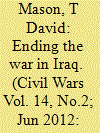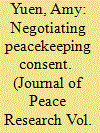|
|
|
Sort Order |
|
|
|
Items / Page
|
|
|
|
|
|
|
| Srl | Item |
| 1 |
ID:
186863


|
|
|
|
|
| Summary/Abstract |
The ability to finance conflict likely affects the odds of sustaining a war and succeeding in it. Recent literature explores rebel group funding, but far less is known about how states finance their own war efforts. This article posits that the design of central banks should affect civil war termination. In particular, it argues that central bank independence affects civil war termination through two channels. First, financial markets consider central bank independence as a good signal in terms of macroeconomic stability and debt repayment. In this way, independent central banks enhance the ability of the government to access credit to finance and end a civil war. Second, central bank independence is associated with lower inflation. Inflation control reduces one source of additional grievances that the civil war may impose on citizens. On a sample of civil wars between 1975 and 2009, central bank independence is associated with a substantial increase in the likelihood of war termination. When the form of termination is disaggregated, (higher) central bank independence is associated with a higher probability of government victory, relative to continued conflict and to other outcomes. Additional tests provide support for the argued mechanisms: during civil wars, countries with more independent central banks access international credit markets in better conditions – i.e. they pay lower interest rates, and receive longer grace and maturity periods on new debt. Furthermore, in countries experiencing civil wars, central bank independence is associated with lower inflation.
|
|
|
|
|
|
|
|
|
|
|
|
|
|
|
|
| 2 |
ID:
113527


|
|
|
|
|
| Publication |
2012.
|
| Summary/Abstract |
Since the war in Iraq began in 2003, public debate over the war has centered on two options: either increase the number of US troops to defeat the insurgency, or withdraw US forces to reduce US losses. Empirical research on civil war termination suggests that neither of these two options is likely to produce a favorable outcome for the US or the Iraqi government. That same research points to the third option - negotiated settlement - that has been the most frequent manner in which civil wars have terminated in the post-Cold War era. I analyze what existing research on civil war termination suggests about how the civil war in Iraq can be brought to an end. Military victory over the insurgents is unlikely, but withdrawal increases the risk of state failure. A negotiated settlement would require a credible third-party mediator to broker an agreement between the government, Sunni insurgents, and Shiite militias, thereby isolating foreign jihadists to spoiler status. Implementation of the settlement and the durability of the peace would be enhanced by multinational peacekeeping forces.
|
|
|
|
|
|
|
|
|
|
|
|
|
|
|
|
| 3 |
ID:
157583


|
|
|
|
|
| Summary/Abstract |
The International Criminal Court’s interventions have prompted debate about the wisdom of criminally prosecuting combatants while attempting to build peace in conflict-ridden societies. Previous research fails to distinguish between different types of trials. Using a large-N dataset of three types of criminal trials undertaken during internal conflict – domestic security trials of rebels, domestic human rights trials of state agents, and international war crimes trials of both – this article tests a theory of the compellent effect of criminal prosecution on conflict termination. We find that, even when accounting for endogeneity, rebel trials are associated with a higher probability of conflict termination, while trials of state agents are weakly associated with conflict persistence. We argue that the former compel the opposition to discontinue fighting, while the latter signal to rebels a lack of government resolve. We also find that the effect of international trials, which at times appear weakly associated with conflict termination, is endogenous to international intervention more generally.
|
|
|
|
|
|
|
|
|
|
|
|
|
|
|
|
| 4 |
ID:
173889


|
|
|
|
|
| Summary/Abstract |
The mixed record on civil war termination shows that it is a difficult task, one fraught with uncertainty and risk. Gaining consent for peacekeeping is one strategy policymakers and scholars forward to reduce these concerns. Formal and informal work argues that allowing peacekeeping serves as a costly signal of peaceful intentions; however, these models treat peacekeeping costs as exogenous. I argue that peacekeeping costs have an endogenous element and use consent for peacekeeping missions as a proxy measure. Three conclusions are evident. It is difficult to determine whether belligerents are insincere actors in a peace process or merely distrustful, but consent can tell us whether a ceasefire is precarious and therefore more likely to fail; peacekeeping is difficult but meaningful under some conditions, and reliable information can be taken from negotiating, not just war-fighting. These results qualify the extent to which peacekeeping, with its changing emphasis on consent, can improve its outcomes.
|
|
|
|
|
|
|
|
|
|
|
|
|
|
|
|
|
|
|
|
|